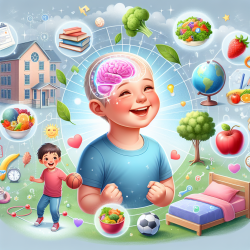Introduction
In the quest to enhance children's learning abilities, the spotlight often falls on traditional educational methods. However, a groundbreaking study titled How Lifestyle Factors Affect Cognitive and Executive Function and the Ability to Learn in Children reveals that lifestyle factors such as diet, physical activity, and sleep play a crucial role in cognitive development and learning outcomes.
The Impact of Diet on Learning
Diet is a cornerstone of cognitive function. The study highlights that a balanced diet rich in nutrients like omega-3 fatty acids, iron, and zinc can significantly enhance brain function and learning capabilities. For instance, omega-3 fatty acids are linked to improved memory and cognitive function, while iron is crucial for brain development and preventing cognitive delays.
Practitioners should encourage parents and schools to provide meals that are not only balanced but also tailored to support cognitive health. This includes incorporating foods high in these essential nutrients and minimizing high-glycemic foods that can lead to energy crashes and decreased attention spans.
Physical Activity: More Than Just Exercise
Physical activity is not just about maintaining physical health; it has profound effects on the brain's structure and function. The study underscores that regular physical activity enhances cognitive flexibility, working memory, and executive function. Aerobic exercises, in particular, are associated with increased hippocampal volume, which is crucial for memory and learning.
Educators and therapists should advocate for integrating physical activity into daily routines, not just as a break from academics but as a vital component of cognitive development. Schools can implement short, frequent activity breaks to boost students' focus and learning efficiency.
The Role of Sleep in Cognitive Development
Sleep is another critical factor influencing learning and cognitive function. Adequate sleep is essential for memory consolidation and overall cognitive performance. The research indicates that children who experience regular, quality sleep exhibit better attention, problem-solving skills, and academic performance.
Practitioners should work with families to establish consistent sleep routines and address any sleep disorders that may hinder a child's learning potential. Educating parents on the importance of sleep hygiene can lead to significant improvements in their children's academic achievements.
Socio-Economic Factors and Learning
Socio-economic status (SES) plays a significant role in children's access to nutritious food, opportunities for physical activity, and quality sleep. The study highlights that children from lower SES backgrounds often face challenges that can impede their cognitive development and learning outcomes.
To bridge this gap, it is crucial for policymakers and educators to advocate for equitable access to resources that support healthy lifestyles. This includes providing free or subsidized meals, safe spaces for physical activity, and community programs that educate families on healthy lifestyle practices.
Conclusion
While traditional educational methods remain vital, incorporating lifestyle factors into learning strategies can significantly enhance children's cognitive development and academic success. By focusing on diet, physical activity, and sleep, practitioners can create a holistic approach that supports optimal learning outcomes for all children.
To delve deeper into this research, I encourage you to read the original study: How Lifestyle Factors Affect Cognitive and Executive Function and the Ability to Learn in Children.










